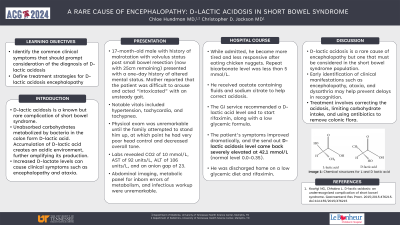Sunday Poster Session
Category: Pediatrics
P1480 - A Rare Cause of Encephalopathy: D-Lactic Acidosis in Short Bowel Syndrome
Sunday, October 27, 2024
3:30 PM - 7:00 PM ET
Location: Exhibit Hall E

Has Audio

Chloe Hundman, MD
University of Tennessee Health Science Center
Memphis, TN
Presenting Author(s)
Chloe Hundman, MD, Christopher D.. Jackson, MD
University of Tennessee Health Science Center, Memphis, TN
Introduction: D-lactic acidosis is a known but rare complication of short bowel syndrome. Unabsorbed carbohydrates metabolized by bacteria in the colon form a bi-product known as D-lactic acid. Accumulation of D-lactic acid creates an acidic environment, further amplifying its production. Increased D-lactate levels can cause clinical symptoms such as encephalopathy and ataxia. Treatment involves correcting the acidosis, limiting carbohydrate intake, and using antibiotics to remove colonic flora.
Case Description/Methods: A 17-month-old male with a history of malrotation with volvulus status post resection of small bowel (now with 25cm remaining) presented with a one day history of altered mental status. Mother reported that the patient was difficult to arouse and acted “intoxicated” with an unsteady gait. Vitals in the emergency department were notable for hypertension, tachycardia, and tachypnea. The physical exam was unremarkable until the family attempted to stand him up, at which point he had very poor head control and decreased overall tone. Labs were notable for CO2 of 10 mmol/L, AST of 92 units/L, ALT of 106 units/L, and an anion gap of 23. Abdominal imaging, metabolic panel for inborn errors of metabolism, and infectious workup were unremarkable. During admission, he became more tired and less responsive. The bicarbonate level was repeated and was less than 5 mmol/L. He received acetate containing fluids and sodium citrate to help correct acidosis. Gastroenterology service evaluated the patient and recommended a D-lactic acid level and to start rifaximin, along with a low glycemic formula. The patient’s symptoms improved dramatically, and D-lactic acidosis level came back severely elevated at 42.1 mmol/L (normal level 0.0-0.35). He was discharged home on a low glycemic diet and rifaximin.
Discussion: D-lactic acidosis is a rare cause of encephalopathy but one that must be considered in the short bowel syndrome population. Early identification of clinical manifestations such as encephalopathy, ataxia, and dysarthria may help prevent delays in recognition.
Disclosures:
Chloe Hundman, MD, Christopher D.. Jackson, MD. P1480 - A Rare Cause of Encephalopathy: D-Lactic Acidosis in Short Bowel Syndrome, ACG 2024 Annual Scientific Meeting Abstracts. Philadelphia, PA: American College of Gastroenterology.
University of Tennessee Health Science Center, Memphis, TN
Introduction: D-lactic acidosis is a known but rare complication of short bowel syndrome. Unabsorbed carbohydrates metabolized by bacteria in the colon form a bi-product known as D-lactic acid. Accumulation of D-lactic acid creates an acidic environment, further amplifying its production. Increased D-lactate levels can cause clinical symptoms such as encephalopathy and ataxia. Treatment involves correcting the acidosis, limiting carbohydrate intake, and using antibiotics to remove colonic flora.
Case Description/Methods: A 17-month-old male with a history of malrotation with volvulus status post resection of small bowel (now with 25cm remaining) presented with a one day history of altered mental status. Mother reported that the patient was difficult to arouse and acted “intoxicated” with an unsteady gait. Vitals in the emergency department were notable for hypertension, tachycardia, and tachypnea. The physical exam was unremarkable until the family attempted to stand him up, at which point he had very poor head control and decreased overall tone. Labs were notable for CO2 of 10 mmol/L, AST of 92 units/L, ALT of 106 units/L, and an anion gap of 23. Abdominal imaging, metabolic panel for inborn errors of metabolism, and infectious workup were unremarkable. During admission, he became more tired and less responsive. The bicarbonate level was repeated and was less than 5 mmol/L. He received acetate containing fluids and sodium citrate to help correct acidosis. Gastroenterology service evaluated the patient and recommended a D-lactic acid level and to start rifaximin, along with a low glycemic formula. The patient’s symptoms improved dramatically, and D-lactic acidosis level came back severely elevated at 42.1 mmol/L (normal level 0.0-0.35). He was discharged home on a low glycemic diet and rifaximin.
Discussion: D-lactic acidosis is a rare cause of encephalopathy but one that must be considered in the short bowel syndrome population. Early identification of clinical manifestations such as encephalopathy, ataxia, and dysarthria may help prevent delays in recognition.
Disclosures:
Chloe Hundman indicated no relevant financial relationships.
Christopher Jackson indicated no relevant financial relationships.
Chloe Hundman, MD, Christopher D.. Jackson, MD. P1480 - A Rare Cause of Encephalopathy: D-Lactic Acidosis in Short Bowel Syndrome, ACG 2024 Annual Scientific Meeting Abstracts. Philadelphia, PA: American College of Gastroenterology.
